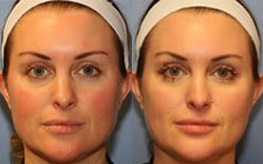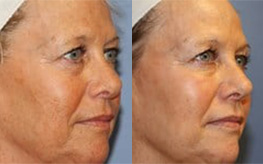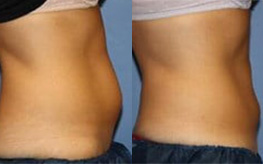Acne scarring is frustrating because it lingers around even when acne has made a (not always so) graceful exit. You’ve fought your battle with acne, and now you’ve got a constant reminder of its presence?? Not fun.
At Allegro Medspa, we understand the frustration of acne scars. That’s why we want to help you reduce their appearance once and for all! Read these 5 ways to treat acne scarring so you can look and feel your best!
Contents
1. Make the switch to medical grade skincare products
This is not only one of the best ways to treat acne scarring but is also a preventative measure. Medical grade skincare products are different from over-the-counter products in that they penetrate deeper than the first layer of skin. Their ingredients are meant to actually change the biology of the skin, instead of just temporarily masking a problem. That means when you use a medical-grade skincare product, there are permanent and effective changes happening.
Paired with the other items on this list, using medical-grade skincare products is one of the best ways to treat acne scarring. These products can help to produce more collagen, even skin tone, cleanse, and moisturize, all of which help repair the scarring caused by acne.
2. Get a chemical peel
We offer a variety of chemical peels at our medspa, and they are super effective at healing acne scarring. Acne scarring causes pigmentation differences on the skin, and chemical peels even those tones out.
Different levels of peels will give different results, but they all get rid of the oldest layer of skin, allowing new skin to grow. After the chemical peel removes the old, dead layer of skin, your skin will repair itself with a clearer, smoother complexion!
3. Include retinol in your skincare routine
Retinol is derived from vitamin A and is used in many medical-grade skincare products. It goes deep beneath the first layer of skin (the epidermis) and works to stimulate collagen and elastin growth. Retinol helps to reduce the appearance of acne scarring because collagen and elastin both create plumper, smoother skin.
You can easily incorporate Retinol products like SkinMedica Retinol .1% into your daily routine. Just wash your face before bed, apply the retinol serum, wait for it to dry, then apply your moisturizer!
4. Microneedling
Microneedling is a medical spa procedure that uses radiofrequency technology to rejuvenate the skin. This technique uses tiny, sterile needles to create a small amount of damage to the skin. This may sound counterintuitive, but instead of harming the skin, what it does is urge the skin to heal itself, growing new collagen and smoothing out the texture of the face.
5. Use sunscreen
Sunscreen is always a good idea, but it’s absolutely essential for treating acne scars. Using sunscreen can even pigmentation in the skin, reducing the appearance of uneven skin tone due to acne scarring.
Your skin is also more susceptible to the effects of the sun when using retinol or peel treatments, so you’ll definitely want to incorporate it into your routine.
Elta MD Clear SPF 46 sunscreen is perfect for people with acne scarring not only because it protects from the sun, but also because it contains lactic acid. Lactic acid helps to regenerate cells in the skin, and as a result of use, the skin appears smoother.
Schedule a consultation with us
If you’d like to talk more about ways to treat acne scarring, come sit down and talk to the aesthetic experts! We would love to meet and go over a unique treatment plan just for you!






